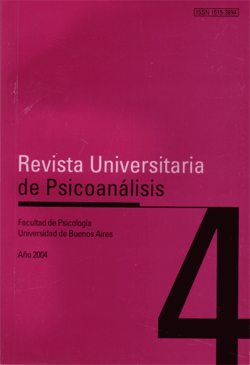Revista Universitaria de Psicoanálisis - Volumen IV

El estatuto de la UNTERDRÜCKUNG en textos freudianos
The statute of the UNTERDUCKUNG in freudian textbooks
Autor/es: Cristina Gabriela Bösenberg
RESUMEN
Palabras clave:
The objective of the present work is to interrogate the peculiar statute of the Unterdrückung, translated by Etcheverry like "suffocation", in Freud's work. The importance of locating it as a specific psychic mechanism and the particular ways to return of the material affected by the same one.
A first approach to the thematic indicates that the Unterdrückung keeps it narrows relationship with the repression. However the way of return of the material affected by the same one presents a very particular statute. The illustrations that Freud presents in this context have the particularity of phenomena that they don't transit via formations of the unconscious but rather they are presented as: visions, hallucinations, on in scene (performances), intense sensorial experiences and/or of character hipernítido that they are imposed to the fellow's perception like coming from" an exterior." Freud clarifies, however that is not of phenomena inside the psychosis.
Starting from that developed he/she puts on in question the possibility to consider the mechanism of the Unterdrückung, like a road of interesting access to give this way bill of some psychic and clinical particularities characteristic of those calls" pathologies narcisistas" of" it embroiders"," current." That is to say, phenomena whose statute cannot be quickly located in relation to the neuroses, psychosis or perversions. Phenomena that involve a way to return that doesn't transit via formations of the unconscious as it would happen to the psychic material affected by the repression Verdrängung, but Freud seems to differentiate it, of the return phenomena frankly sicóticos that in the Chapter III of Freud Schreber has more than enough they are linked with the Aufhebung.
SUMMARY
El objetivo del presente trabajo es interrogar el estatuto particular de la Unterdrückung, traducida por Etcheverry como "sofocación" en la obra de Freud. La importancia de situarlo como un mecanismo psíquico específico y los modos de retorno propios del material afectado por el mismo.
Una primera aproximación a la temática indica que la Unterdrückung guarda una estrecha relación con la represión. Sin embargo, el modo de retorno del material afectado por la misma presenta un estatuto muy particular. Las ilustraciones que Freud presenta en este contexto tienen la particularidad de fenómenos que no transitan vía formaciones del inconciente sino que se presentan como: visiones, alucinaciones, puestas en escena (actuaciones), vivencias sensoriales intensas y/o de carácter hipernítido que se imponen a la percepción del sujeto como provenientes desde "un exterior". Freud aclara, sin embargo, que no se trata de fenómenos dentro de la psicosis.
A partir de lo desarrollado se pone en cuestión la posibilidad de considerar el mecanismo de la Unterdrückung, como una vía de acceso interesante para dar cuenta de algunas particularidades psíquicas y clínicas propias de las así llamadas "patologías narcisistas" de "borde", "actuales". Es decir, fenómenos cuyo estatuto no puede ser rápidamente ubicado con relación a las neurosis, psicosis o perversiones. Fenómenos que involucran un modo de retorno que no transita vía formaciones del inconciente como sucedería con el material psíquico afectado por la represión Verdrängung, pero tampoco, Freud parece diferenciarlo, de los fenómenos de retorno francamente psicóticos, que en el Capítulo III de Freud sobre Schreber quedan vinculados con la Aufhebung.
Keywords:
UNTERDRÜCKUNG – Sofocación, Represión, Levantamiento-Cancelación, Modos de retorno, "Patologías actuales" – Fenómenos de franja.
Secretaría e Instituto de Investigaciones
Lavalle 2353
Tel/fax:4952 – 5481/ 4952 – 5490
Horario de atención: 10 a 17 hs
E-mail:
instinve@psi.uba.ar











